The Truth About Our Medicines
This page details just SOME of the side effects, disturbances and irregularities that we happily put ourself at risk to... I'm not saying don't do medicine at all... just PLEASE BE AWARE, and make an educated decision.
Drugs given to Mental Health patients
This topic is close to my heart, as our of all them, however having a friend that suffers from paranoid schizophrenia I get to see first hand the effect drug changes have on her, and to see what is actually aiding her regression not progression; (The symptoms of schizophrenia include delusions, hallucinations, disorganized thinking and speech and it also includes a certain level of occupational and social dysfunction. ) Now please appreciate that I am not saying all medication causes the worst side affects, however I believe a person and/or their carer must be advised about before agreeing to take it
ABILIFY
Abilify is an antidepressant and anti-psychotic medication which is used for treating a number of mental disorders and mood disorders.
It was first approved for use in treating schizophrenia, a mental disorder which is characterized by certain disintegration of emotional responses and thought processes. However, when treated by medication, schizophrenia can be managed and patients suffering from it can lead relatively normal lives.
Another disorder for which Abilify is used is bipolar disorder. It is a mood disorder which is characterized by a combination of manic episodes and depressive episodes. However, in some people, the depressive episodes are absent and in some people these two sides of the spectrum change rapidly, which is called rapid cycling. Abilify in particular is used for treating and managing manic and mixed episodes, which are in fact episodes that are both manic and depressive at the same time. Abilify can also be used in treating major depressive disorder, which is another mood disorder which is characterized by an all-around low mood, low self-esteem and loss of interest and pleasure in activities that are normally enjoyable. Major depressive disorder should not be confused with depression that most off people feel at one point or another. It is a condition that affects the lifestyle of the individual, their relationship with other people and the way in which they function in society.
Furthermore, Abilify can also be used in treating irritability in patients who suffer from autism, especially children over the age of six. Use of Abilify helps reduce aggression, changing moods, irritability and proneness to self-injury which sometimes occur in individuals suffering from autism.
Another potential use for Abilify is in treating cocaine dependency, although this use is still experimental and needs further research in order to be fully approved.

Now check the SIDE AFFECTS (and lets remember this is meant to help a digressional, psychotic ‘disorder’)
Severe allergic reactions (rash; hives; itching; difficulty breathing; tightness in the chest; swelling of the mouth, face, lips, or tongue); abnormal thinking; chest pain; confusion; fainting; fast, slow, or irregular heartbeat; fever, chills, sore throat; increased sweating; involuntary movements of the tongue, face, mouth, jaw, arms, legs, or back (eg, chewing movements, puckering of mouth, puffing of cheeks); loss of control over urination; loss of coordination; muscle tremor, jerking, or stiffness; new or worsening mental or mood problems (eg, anxiety, depression, agitation, panic attacks, aggressiveness (and its meant to treat that?), impulsiveness, irritability, hostility, exaggerated feeling of well-being, inability to sit still); one-sided weakness; seizures; severe or persistent restlessness; shortness of breath; suicidal thoughts or attempts; swelling of the hands, ankles, or feet; symptoms of high blood sugar (eg, increased thirst, urination, or appetite; unusual weakness); trouble swallowing; trouble walking; unusual bruising; unusual tiredness or weakness; vision or speech changes.
Now those are the small ones… bigger issues inc.
Elderly patients with dementia-related psychosis treated with antipsychotic drugs are at an increased risk of death. Analyses of seventeen placebo-controlled trials (modal duration of 10 weeks), largely in patients taking atypical antipsychotic drugs, revealed a risk of death in drug-treated patients of between 1.6 to 1.7 times the risk of death in placebo-treated patients. Over the course of a typical 10-week controlled trial, the rate of death in drug-treated patients was about 4.5%, compared to a rate of about 2.6% in the placebo group. Although the causes of death were varied, most of the deaths appeared to be either cardiovascular (eg, heart failure, sudden death) or infectious (eg, pneumonia) in nature. Observational studies suggest that, similar to atypical antipsychotic drugs, treatment with conventional antipsychotic drugs may increase mortality.
Abilify can cause a life-threatening condition called neuroleptic malignant syndrome (NMS).
Abilify can cause sudden death
Abilify can cause tardive dyskinesia a condition involving unusual, uncontrollable body or face movements. The condition can become permanent (even if Abilify is stopped). The best way to prevent it from becoming permanent is to tell your healthcare provider right away if you notice any abnormal movements (including abnormal movements of the tongue) while taking Abilify.
There is an increased risk of stroke in elderly people who take Abilify for dementia
Orlanzaphine
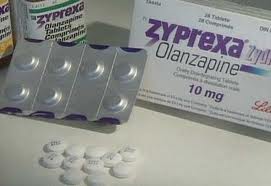
Olanzapine (Zyprexa®) is a prescription medicine that belongs to a class of drugs known as "atypical antipsychotics " It has been licensed to treat the following conditions: Schizophrenia & Bipolar disorder
Orlanzaphine is similar to Abilify in that the side effects are the same plus the long-acting injectable form of this medication can cause a serious condition known as post-injection delirium/sedation syndrome. This usually occurs shortly after an injection.
Lithium
Lithium is a naturally occurring element, like potassium or calcium
In the 1800s, scientists thought that lithium might be an effective treatment for gout, although it was found to be ineffective for this use.
Later, in the 1940s, it was used as a salt substitute, until it was withdrawn from the market due to several deaths that were caused by lithium toxicity. Later, it was discovered that lithium works for mania. In 1970, the U.S. Food and Drug Administration (FDA) approved the medication for the treatment of bipolar disorder?!
The exact way in which the drug works to treat bipolar disorder is not known. Lithium may affect various chemicals in the brain called neurotransmitters, which could explain the its effectiveness in treating bipolar disorder. The medication is not a cure for the condition, however -- it only helps to control symptoms so they say
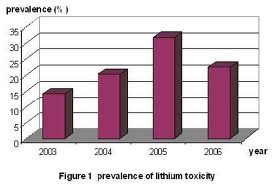
All medications can produce toxicity if taken in high enough doses. For most medications, however, the effective dose is much lower than the toxic dose (and toxicity is rare, except in cases of an overdose). With other medications, such as lithium, the effective dose is close to the toxic dose, and toxicity is more common.
The following side effects may be signs of mild to moderate toxicity:
Mild shakiness, especially in the hands , Thirst , Increased or frequent urination,
Signs of more severe toxicity include: Giddiness, Blurred vision, Ringing in the ears (tinnitus), Severe shakiness,
Because the effective lithium blood level is so close to the toxic blood level, many people must endure mild symptoms of lithium toxicity in order to take an effective dosage. It is not unusual for people to have mild hand shakiness (tremors), thirst, and increased urination the entire time they are taking lithium. However, if your symptoms become worse (or if you have new symptoms), this may signal a problem with lithium toxicity.
General Medicines
In 2004, some patients began reporting that their weakness and pain was severe, and they were also experiencing loss of muscle control and coordination. congestive heart failure. However, it can affect almost all of your five senses.
Vasotec (generic name enalapril) is a drug designed to treat high blood pressure and
congestive heart failure. However, it can affect almost all of your five senses. Vasotec can cause you to lose your sense of smell (a condition known as anosmia) and taste, as well as have ringing in your ears (tinnitus) and eye problems like blurred vision and dry eyes. All of these are referred to as minor side effects, but if you were experiencing them all at once, you might consider them major.
Mirapex, along with its many other potential side effects, can also cause hallucinations. Parkinson's disease patients have reported seeing everything from snakes crawling the walls to people hiding in their closets
Lariam (generic name mefloquine) was invented by researchers at the Walter Reed Army Institute of Research to prevent and treat outbreaks of malaria in the U.S. Army. Until recently, it was given routinely to soldiers deployed overseas as well as many tourists. Lariam carries some serious side effects -- one of them being hallucinations. Both soldiers and tourists have reported experiencing frightening hallucinations as well as violent psychotic behavior soon after taking the drug [source: CBS News]. Since the early 2000s, the FDA has required that patients be screened for a history of depression and psychosis before taking Lariam. Lariam is not a drug that one would routinely associate with mental instability, but Paxil (generic name paroxetine) is. Paxil is an antidepressant, used to treat everything from depression to post-traumatic stress disorder. But many patients have reported suicidal ideation while taking Paxil. In 2003, the FDA advised that children and adolescents under the age of 18 shouldn't be prescribed Paxil to treat major depression, due to this potential risk [source: FDA]. The advisement was later expanded to include adults up to age 30 [source: FDA]. There are currently numerous lawsuits alleging Paxil's role in suicides and suicide attempts (as well as the severe withdrawal symptoms that some patients have experienced). Documents in one of these lawsuits revealed that Paxil's maker, GlaxoSmithKline, may have hid data demonstrating the link between the drug and increased thoughts of suicide [source: BBC News].Sauer and Walter skin irritation; worsening dryness.
Viagra (generic name sildenafil citrate), can cause strange things to happen to your vision. Viagra is used to treat erectile dysfunction. Patients taking it have reported experiencing not only blurred vision, but also blue vision and problems distinguishing between the colors blue and green. In 2005, researchers at the University of Minnesota theorized that Viagra users can experience permanent vision loss due to blood flow to the optic nerve being cut off, known as nonarteritic ischemic optic neuropathy (NAION) [source: Medical News Today ].
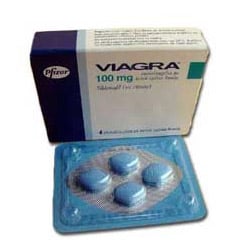
One of the lesser side effects of Chantix (generic name varenicline), a prescription drug designed to help people stop smoking, is nightmares and night terrors. Night terrors aren't just scary dreams; people who experience them are struck by fear and partially awaken out of sleep, sometimes screaming or moaning. They don't usually wake up completely, and they don't always remember that the incident even happened.
Ambien (generic name zolpidem), have also reported night terrors and nightmares. Both Lunesta and Ambien patients, though, have experienced an even weirder effect: performing activities in their sleep. These activities include not only sleepwalking, but eating, making phone calls, having sex and driving -- yes, driving. Patients taking these sleep aids have woken up while backing their cars out of driveways or while shopping at all-night grocery stores. Some "Ambien drivers" have been arrested for driving while impaired and causing accidents [source: CBC News]. Both drugs' makers include warnings about these side effects and emphasize that they shouldn't be taken with alcohol (which can exacerbate the effect).
Xenical (generic name orlistat, now sold over the counter in a lower dosage as Alli) is designed to prevent the body from absorbing fat and therefore decrease the actual calorie intake of its users. During Xenical's clinical trial, researchers found that up to 30 percent of ingested fat was excreted unabsorbed by subjects [source: Xenical]. Patients must follow a low-fat diet of around 15 grams of fat per meal. If they don't, there can be disastrous results. According to Roche Laboratories, side effects of Xenical include "gas with oily discharge, an increased number of bowel movements, an urgent need to have them, and an inability to control them, particularly after meals containing higher amounts of fat than are recommended" [source: Xenical ].Alli Web site]. Alli was initially very popular with dieters. Sales have declined sharply, however -- quite possibly due to this rather weird and gross side effect.
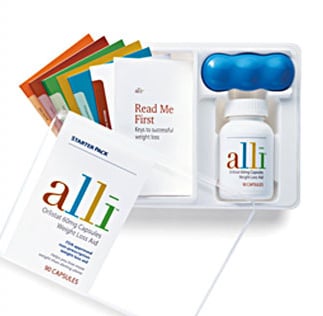
Alli came on the market in 2007, and although it's a lower dosage of orlistat than Xenical -- 60 mg instead of 120 mg -- it still has the same side effects (which Roche calls "treatment effects"). Roche's Alli Web site states that "it's probably a smart idea to wear dark pants, and bring a change of clothes with you to work" when you first begin taking Alli
In addition to causing hallucinations, Lariam has been blamed for the suicides of some soldiers and has also been named as the reason behind the murders of several soldiers' wives [source:CBS News]. It hasn't been officially established that Lariam can lead to paranoia and suicidal ideation (the medical term for suicidal thoughts) in patients. However, its manufacturer, Roche Pharmaceuticals, added, "Some patients taking Lariam think about killing themselves, and there have been rare reports of suicides" to its list of potential side effects. In 2005, the Army stopped routinely distributing Lariam to its overseas troops [source: MSNBC ].
Chantix can also lead to suicidal ideation. In February 2008, the FDA issued a warning which included not only the possibility of suicidal thoughts but actual suicide. It reports that at least 40 suicides and 400 attempted suicides have been linked to the drug
Nurofen Tablets/Caplets - possible side effects

Disorders of the stomach and intestines including abdominal discomfort or pain, nausea, stomach ulcer, vomiting containing either blood or brown grit (like coffee grounds), black tarry stools, worsening of existing bowel diseases (ulcerative colitis or Crohn’s disease).
Blood disorders resulting in unexplained or unusual bruising or bleeding, fever, sore throat, mouth ulcers, extreme pallor or weakness.
Allergic reactions including worsening of asthma, unexplained wheezing or shortness of breath, swelling of the face and tongue, collapse. In addition, there may be skin reaction (including hives and itching): these can sometimes be severe with blistering and peeling of skin .
Liver disorders that may be indicated by yellowing of the skin and eyes and/or pale stools and dark urine.
Kidney disorders that may be indicated by passing less or more urine than normal, cloudy urine, blood in the urine, pain in the back and/or swelling (particularly of the legs).
Nervous system disorders indicated by severe headache, neck stiffness, disorientation, and light hurting the eyes.
CHILDRENS MEDICINES & PRODUCTS
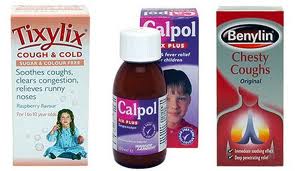
Tixylix for children - side effects
Drowsiness.
Dizziness.
Disturbances of the gut such as diarrhoea, constipation, nausea, vomiting or abdominal pain.
Blurred vision.
Dry mouth.
Headache.
Rash.
Awareness of the heartbeat (palpitations).
This notice was limitedly distributed in March 2009:
Over-the-counter cough and cold medicines for children have recently been under review in the UK. New advice is that several cough and cold medicines, including this one (tixylix) , are no longer recommended for children under six years of age. This is because there is no evidence that they work in this age group, and they can potentially cause side effects such as allergic reactions, effects on sleep or hallucinations - looking this information up confirmed to me what I had already seen with my son (hallucinations and disturbed sleep) which was very scary to witness. I immediately stopped him taking it.
Johnson's Baby Cream: Mild side effects include
Mild itching, burning, or stinging.
SEVERE side effects when using Johnson's Baby Cream include:
Severe allergic reactions (rash; hives; itching; difficulty breathing; tightness in the chest; swelling of the mouth, face, lips, or tongue); severe or persistent itching, burning, or stinging;
Calpol
Calpol is a veritable cocktail of sweeteners, flavourings, preservatives and colourants to make the product appealing and palatable to infants. These additives include strawberry 'flavouring' and carmoisine (E122- suspected carcinogen, banned in Austria, Japan, Norway, Sweden and the US) to produce its pink colour.
It also contains, Maltitol (a mild laxative), glycerol (E422 - large quantities can cause headaches, thirst and nausea), sorbitol (E420 - large quantities can cause stomach upset), the paraben preservatives methyl parahydroxybenzoate (E218 - suspected hormone disrupter and allergen), propyl parahydroxybenzoate (E216 - suspected hormone disrupter and allergen), ethyl parahydroxybenzoate (E214 - suspected hormone disrupter, banned in France and Australia), and a thickener xanthan gum (E415 - no known adverse effects).
Being such an interesting E-cocktail, it's not surprising that it can cause allergic reactions (such as skin rashes and hayfever-like symptoms), tiredness, unexpected bleeding or tendency towards bruising as well as headache, nausea.
Using paracetamol to treat fever may also result in your child having a seemingly endless round of colds, since the body's natural fever reaction was not allowed to kill the virus causing the illness leaving your child to be reinfected again and again.
The following is a note from the notable and higly respected Dr Llaila Afrika
The Ill Effects of Drug Combinations
By Dr. Llaila O. Afrika
People are destroying their bodies by ingesting Soft drinks, pizza, fast foods, beer, wine and liquor, cleaning drugs, tobacco, hair products, cosmetics and many other products. A single drug changes the body’s biochemistry; it creates chemical confusion, chemical chaos and abnormal biochemistry, which people call a medicine that is helping them to be well. Synthetic, poisonous drugs and chemicals harm the body and do not have a healing or curative effect. The poisons are labeled as medicine and the sick, gullible consumers believe they get rid of diseases by taking poisonous drugs because the drugs are called a medicine.
The majority of people take drugs that do not work. They refuse to take medicinal herbs and supplements because they may interfere with those drugs that do not work. Over 90% of sick people totally rely on the drugs because they are told by drug companies and doctors (allopath-drug describing doctors) to take them. People are afraid to stop taking their prescription ineffective drugs. Combination drugs combine two or more ingredients. Each single drug has side effects that poison and destroy the body and when they put two or more together the side effects of each single drug is added to the other drugs side effect. Chemically the combination of two or more drugs not only has the side effect of each single drug but also the side effect of the new drug created by combining the single drugs together. The side effects clash with each creating side effects for the side effects. The sum total of all the drugs together creates a side effect that combines with the each single drug’s own side effect. Combination drugs are a poisonous marriage of side effect
Time-Release depends on the strength or weakness of an individuals digestive enzymes, the health of the digestive tract, liver and pancreas, bodily acid/alkaline conditions, the food and/or liquid consumed before or after taking the time-release medicine, the time of day consumed, other medications the person is taking, whether person is a slow or fast metabolizer, etc. In other words, time-release is more of a belief (lie) than a scientific fact. “Time-release words are a type of “medicalese” (medical sounding words) that means absolutely nothing.
Eye or Ear and Drugs put on the Skin
Skin disease, eye and/or ear diseases are usually caused by an infection. Infections are the body’s natural defense reaction and the body’s attempt to be well. If the skin is affected then washing the affected skin area with herbal soap, apply antiseptic oils (tea tree, grape seed) and/or an herbal salve or supplement crème (i.e. lysine, zinc) is all that is needed.
If there is no evidence of an infection then synthetic antibiotic chemical use is not needed. Steroids are typically used to treat non-infected skin and should not be used for infections. Steroids stop the natural defense reactions of the body and make the infection worse . Steroids convulsions, hypertension, peptic ulcers, diabetes, loss of muscle tone, glaucoma, mental illness, increased sweating, vertigo, hemorrhaging, menstrual irregularities, impaired wound healing, hormonal problems and mimic the action of the adrenal glands. This means steroids weaken the digestive, reproductive and immune systems. Steroids cause biochemical confusion in the body, the body attempts to readjust its natural biochemical personality and reestablish balance. While the body is trying to normalize itself and readjust it mask (distorts, alters) the obvious signs and symptoms of the infection. Therefore, the ill person believes they are getting better when actually they are getting worse. The body simply made a biochemical decision that fighting the steroids is more important than the infection.
Creams and Ointments
There are many creams, ointments, lotions and liquid solutions for external application to the skin and applications for the eye and ear. Many of the synthetic poisonous chemical concoctions contain the dangerous antibiotic neomycin sulfate. Some of the concoctions are irrational (stupid) fixed ratio drug combinations with neomycin and others combine neomycin with steroids.
Allopathic medicine defends itself by saying alternative remedies make the person subjectively feel up psychological better (placebo effect) while physiological they can feel better but they are physically getting worse. Conventional allopathic drug radiation and surgery medicine does not have a high curative success rate, treatments and drugs are more harmful than the disease itself and the corruption and over charging, misdiagnosis, the extreme high cost cause many to go untreated, and malpractice damage done to patient cause fear. It is not a perfect science and makes many mistakes. Allopathic medicines slowly allow the patient to deteriorate while taking drugs. Allopathic medicine does not correct its mistakes with the same technology that found the disease and not find mistakes or correct mistakes. This scares the consumer. Most of the licensing and/or certifications and regulation in the alternative health field are done to protect the consumer from fraud and unqualified practitioners.
People seeking alternative health practitioners often stop taking their drugs because of the harmful side effects or there is no improvement in their conditions. They get tired of being given one drug after another, taking higher dosages of the same drug and/or taking experimental drugs. The consumers stop taking the drug and starts taking the alternative remedy. The cure of their disease started when they stopped making themselves sick or compounding their sickness with drug medicine. Drug medicine is based upon mixing the truth (nature) with lies/fantasy/theory (mother nature philosophy).
LOTS MORE TO FOLLOW ...
© 2014 Majority NOT Minority Ltd - All rights reserved.
No republication of this material, in any form or medium, is permitted without express permission of the author